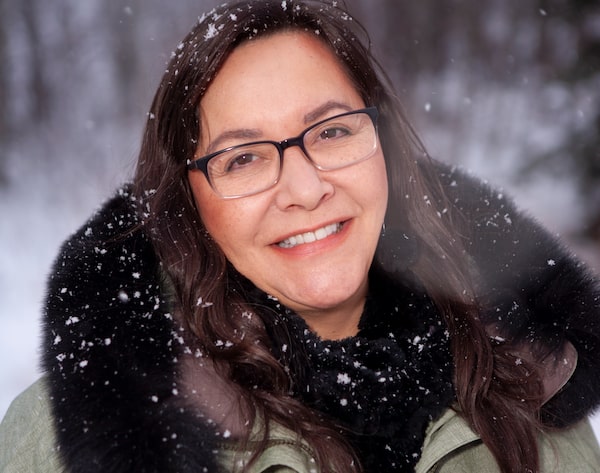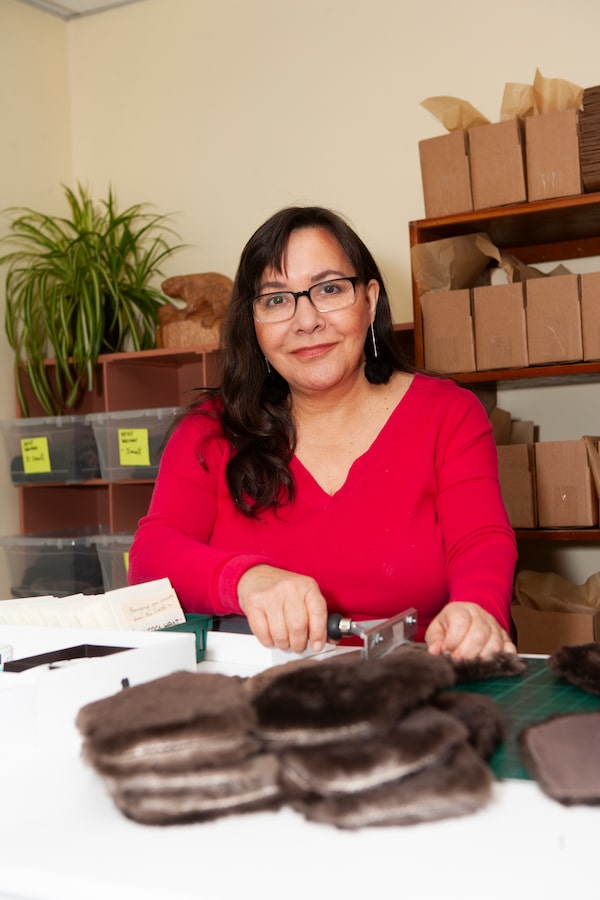
Brenda Dragon, who is of Dënësųłinë́ ancestry, started her business with the idea to make hand warmers out of beaver fur, to be used in place of single-use or battery-operated models.Paul Bannister
After her father died, Brenda Dragon wondered how she could carry on a family tradition dating back generations.
“My father, David Dragon, was a French-Canadian trapper who trapped in the Athabascan Delta (in northern Alberta),” says Ms. Dragon, president and founder of Aurora Heat Inc., a fur products company based in Fort Smith, Northwest Territories. “When he passed away, I thought about what I could do.
“I just didn’t want it to be the end of trapping in our family,” she continued. “It was my father’s lifestyle and connection to nature that he shared with us.”
Ms. Dragon, who is of Dënësųłinë́ ancestry from her mother’s side, had grown up wearing fur, and dressed her own children in fur when they lived in Yellowknife – so she knew how to use the material for warmth and comfort. One day, she had the idea to make hand warmers – the size of a small sardine can – out of beaver fur, to be used in place of single-use or battery-operated models.
“People use something for eight hours and throw it away – none of that made sense to me,” says Ms. Dragon, who launched her business in 2015, a few months after designing her first prototypes. Aurora Heat warmers, by contrast, are made for longevity, and go back to the earth once they’re worn out.
“Our products last a long time – we have customers who bought their warmers eight years ago and are still using them. And they’re biodegradable, so once they’ve worn out they simply go into the compost.”
Today, Aurora Heat manufactures and sells a large line of fur products handcrafted by women in Ms. Dragon’s community, made from beaver pelts supplied by northern and Canadian wild fur trappers. The star products are fur warmers, designed in various shapes and sizes to heat up hands, thumbs, wrists, feet, ankles, heads and bigger body surface areas such as the chest or back. A recent innovation is a pair of sheared beaver discs to keep breasts warm and prevent “nipple visibility.”

Today, Ms. Dragon's company has grown to manufacture and sell a large line of products made from beaver pelts, designed in various shapes and sizes to heat up hands, thumbs, wrists, feet, ankles, heads and bigger body surface areas such as the chest or back.Paul Bannister
Ms. Dragon says these product line expansions are driven partly by her creative impulses and also by her desire to use the entire pelt as a way to respect the beaver. Having grown up around trapping, she felt an imperative to honour her relationship to the animal by using all of it.
Ms. Dragon is growing her company on top of her role as a councillor for her Native Band. She was 53 years old when she started Aurora Heat, and had worked as an education facilitator, and a tourism liaison consultant for the Northwest Territories government before launching her own brand. Entrepreneurship was unfamiliar ground but, being a “pathological optimist,” she jumped right in – with a little help from a network that was initially local but quickly became global.
“Early on I had joined a group of female, Indigenous entrepreneurs and met a lot of women across Canada,” Ms. Dragon recalls. “I found it really interesting – we were all strong and supporting each other.”
Her network – and knowledge of entrepreneurship – expanded in 2020 when she was accepted into the Fireweed Fellowship Program, a national business accelerator for Indigenous entrepreneurs. This program gave her access to, among other things, business mentors and leadership coaches.
Ms. Dragon also joined a global collective of women and non-binary entrepreneurs called Coralus, which supports ventures that work towards the United Nations’ sustainable development goals. For Ms. Dragon, Coralus provided connections to other community- and sustainability-focused entrepreneurs, plus an interest-free business loan.
Shopify’s learning platform for startups also became an invaluable source of information. Ms. Dragon says in the early days of her business she logged into this platform each week to learn about other entrepreneurs’ challenges and to get ideas for improving her e-commerce site.
Aurora Heat customers are a critical part of her still-growing network.
“Part of my business model is to engage with the people who are buying my product,” Ms. Dragon says. “I’m very conscious that these are new-to-market products and a new way of using fur, but it is definitely about replacing what has become disposable. So, being a bit of a disruptor in the market means I need to be an educator while also continually learning from my customers.”
Her conversations with customers have yielded some surprises.
“Some people who are vegetarian have actually said to me: ‘I really debated buying your product, but I went through your entire website and I’m very happy to order from you,’” Ms. Dragon says. “You’ll see similar remarks in some of the reviews on our website – that tells me people are getting what we’re doing.”
Aurora Heat sales have grown consistently year over year and keeping products in inventory has become a challenge. Around the start of the pandemic, when many businesses were suffering, Aurora Heat products caught on among Canadians who wanted to stay warm as they spent more time outdoors. Ms. Dragon says sales are strong even in the warmer months, which she initially thought would be the time to build up inventory.
Her father would have been proud. To ensure customers understand the connection between David Dragon’s trapping heritage to the warmer they’re putting next to their skin, Ms. Dragon encloses with every shipment a piece of paper with the story of how her father’s way of life shaped her nature-based view of the world.
“Growing up in a traditional family with all of us wearing fur, I knew what a difference it made to our family and how it brought us closer to the land,” Ms. Dragon says. “When I first had this idea to make a fur hand warmer, I realized it was a way for me to share this connection to nature with other people.”